Artificial intelligence also contributes to minimizing energy and raw material consumption. ESSENTIAL, Rieter’s digital platform for spinning mill control, for example, enables the detection and elimination of deviations at an early stage in the process.
The integration of the Autoconer X6 winding machine in ESSENTIAL opens up the potential for enhanced transparency and optimization across all process steps. The winding machine is the last process step in the production of ring or compact yarn. It reliably detects foreign fibers, impurities, and unevenness in the yarn and removes these faults. Connection of the winding machine to ESSENTIAL helps make detection of quality deviations during production even more effective. On top of this, it also makes it possible to trace the causes back to upstream process steps and to rectify them.
For example: A combed cotton yarn of yarn count Ne 40 deviates from the quality standard. For a yarn with these criteria, the winding machine normally makes 75 quality cuts per 100 km of yarn. The number of cuts increases with unsatisfactory yarn quality, with an increase in this example to 90 per 100 km of yarn. More cuts translates to more waste, corresponding to an increase from 0.4% to 0.5%. This seemingly small difference correlates to a considerable amount of yarn over the course of a year. For a spinning mill that produces 5 000 tons of yarn per year, this totals five tons of additional waste.
ESSENTIAL Makes Expertise Accessible
If the number of cuts on the winding machine exceeds a preset value, ESSENTIAL analyzes the entire process from fiber to yarn. Deviations are detected and corrective measures initiated based on rules, threshold values, and evaluation of machine events throughout the process. This is how ESSENTIAL uses the potential of artificial intelligence to reflect the expertise of the spinning mill. Evaluation of specific cases will enable the system to learn for the future, thereby allowing further development of the expertise related to optimization of the spinning process.
The use of artificial intelligence is a significant contribution to automation and process optimization and thus to improving sustainability in the textile industry. To expand this capacity in the field of industrial artificial intelligence, Rieter and the Johann Jacob Rieter Foundation are funding a professorship at ZHAW School of Engineering in Winterthur, Switzerland.
